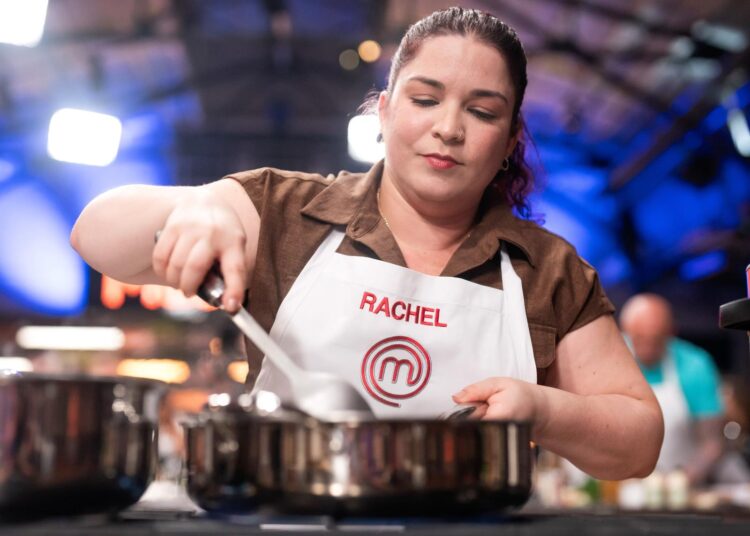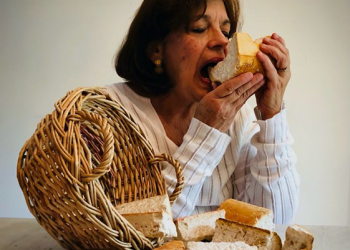Living in Naples, Florida, with her Brazilian husband, Julio Figueredo, Cuban Rachel Sánchez has become one of the most charismatic and authentic contestants on season 15 of MasterChef USA.
This edition, titled Dynamic Duos, offers a novel twist by pairing contestants, and “Rachel & Julio” have stood out as a strong, passionate, and full-of-flavor team. Before a renowned jury, composed of Gordon Ramsay, Joe Bastianich, and Tiffany Derry, they remain in the running for the coveted $250,000 prize.
Since she was a child, Rachel had felt that cooking was more than a mere necessity – it was a language of love, memory, and belonging. “One of the most intense memories I have from my childhood in Cuba is related to cooking. My grandmother was the family cook, the one who seasoned… her food; it inspired me.
“She made honey candies that I will never forget,” she confesses. Those flavors defined her identity, and today are transformed into dishes that captivate both the judges and the audience.
Rachel’s path to MasterChef has been filled with brave decisions and defining moments. “From a very early age, I realized that Cuba wasn’t going to be the country where I would build my future,” she says.
After an eye-opening trip to Spain, she finally settled in the United States, where she started from scratch. The language was one of the biggest challenges: “I thought I knew a lot… but when I arrived here, I realized I knew nothing. That caused me tremendous frustration.”
However, neither nostalgia nor difficulties could extinguish her passion. The kitchen was her constant refuge and also her closest connection to her family. “After my grandmother passed away, many people, upon tasting my dishes — especially the ropa vieja — said I cooked like her. For me, that’s always been a way of honoring her,” she confesses.
That emotional strength is what she now brings to the table on MasterChef, a dream she pursued for years until, in 2023, a producer of the show contacted her directly to invite her to participate.
Although she didn’t make it then, the following year she auditioned again, this time alongside Julio, to compete for a spot in the new Dynamic Duos format. “I was incredibly excited when they accepted us,” she recalls. And it was the least of it: now, with apron and knife in hand, Rachel is cooking not only for a prize, but for a story that smells of honey, countryside and family.
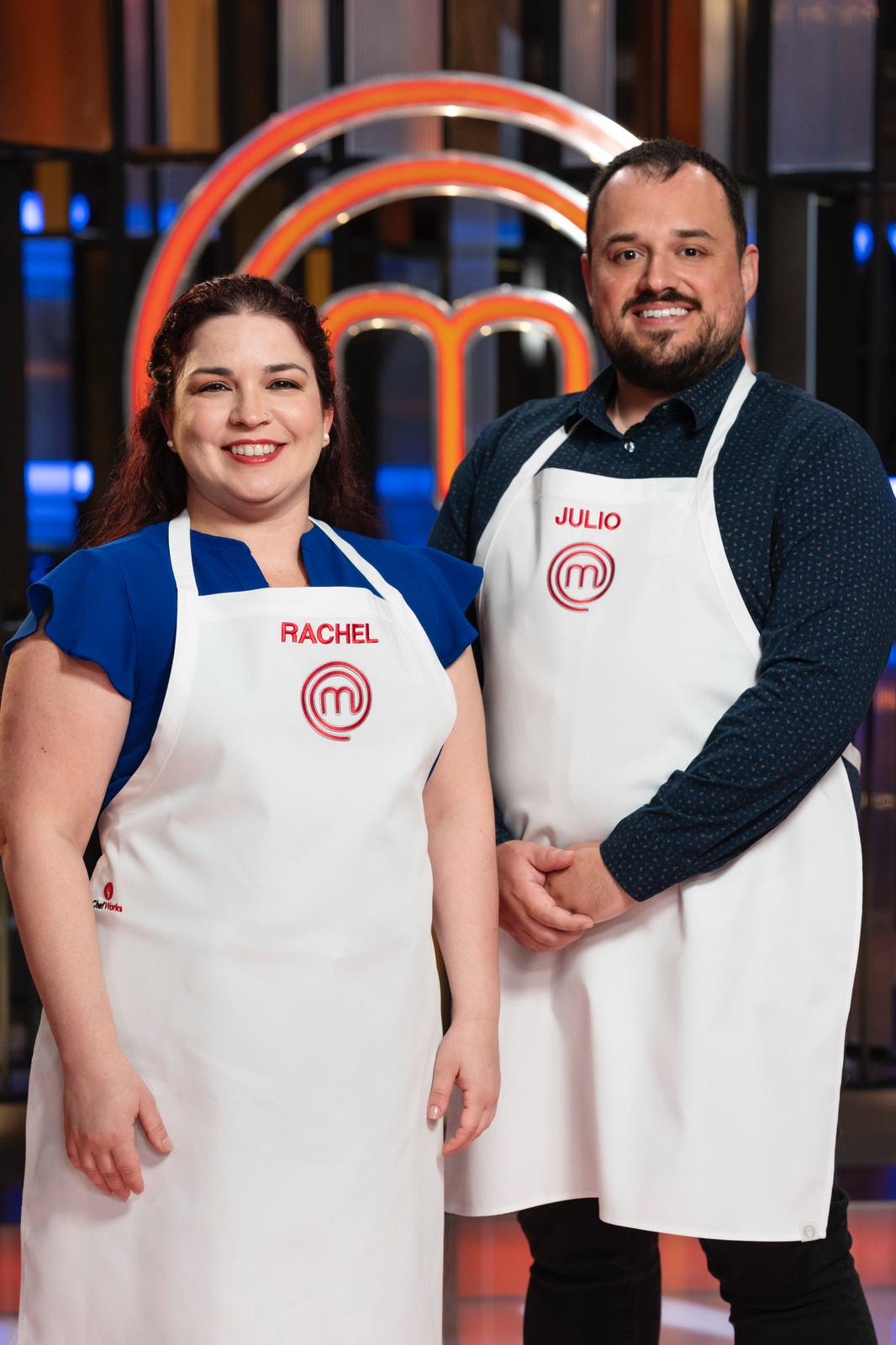
What was that first meeting with the judges like? Did you feel fear, respect, admiration…?
I always thought the judges would be the same: Gordon Ramsay, Joe Bastianich and Aarón Sánchez, whom I deeply admire. I was surprised to learn that this year Aarón wouldn’t be there and that Tiffany Derry would take his place. At first, I was a little sad because, as a Latina and out of respect for Aaron, it was a difficult change. But then I was glad, because Tiffany is an African-American woman, a minority like us Latinos and immigrants.
Her story moved me: she comes from a poor family of farmers, and started working as a waitress in a restaurant. Then she asked to be transferred to the kitchen, became the manager, and today she owns several restaurants.
Gordon, Joe, and Tiffany definitely inspired me a lot. Ever since I started watching cooking shows on television, I dreamed of being there. Of course, I was afraid, especially of failing in front of them and in front of a community I want to represent and make proud. But that fear was also my driving force.
Do you think competing as a couple, like in this edition of Dynamic Duos, is more challenging than competing solo, or does it also offer unique advantages?
Competing as a couple in this new format of Dynamic Duos was definitely a big challenge, but honestly, I think it had more benefits than drawbacks.
In my case, I suffer from anxiety, and although I’d been wanting to participate in MasterChef for years, I also faced several fears. I knew it would be a very intense experience for me.
Having Julio by my side was essential. When I felt overwhelmed or nervous, he helped calm me down.
Also, during the competition, there are times when you get stuck or simply uninspired, and suddenly you have to create a dish with an unexpected ingredient.
That’s where teamwork makes the difference: when one of us gets stuck, the other can step in. There are areas I’m not as good at, which he’s better at, and others — like baking — where I have more experience and could support him.
Of course, there were disagreements or moments when we didn’t agree on how to move forward, but those were minimal compared to all the positive things this shared experience brought us.
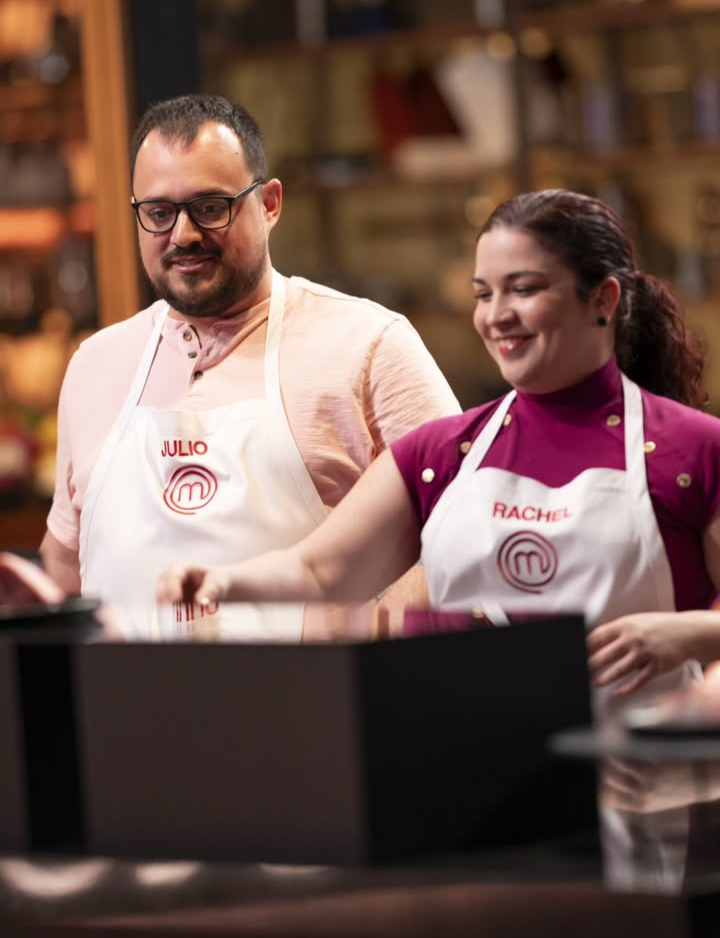
How did you feel when Julio and you got the white apron? What were your thoughts at that moment?
When they told us we were going to Los Angeles and would have the opportunity to compete for a white apron, I felt something very strange in my heart. It was a mix of excitement and nerves, because I thought, “If I make it there, I know I have a fifty-fifty chance…or maybe less.” But even so, there was something inside me that told me we were going to make it.
Obviously, nothing is guaranteed. You arrive knowing you have to give it your all, because the other participants are incredibly talented chefs. You can’t take anything for granted. However, I felt it deep in my heart.
And when you finally have three people you deeply admire in front of you, and they tell you that what you cooked is excellent, that they enjoyed it, and they also give you constructive criticism that you can use to continue growing…that is priceless.
Some people would pay thousands of dollars to experience a moment like that, and we experienced it there, firsthand.
It was definitely an immense joy that I will never forget.
What was the most difficult part of the competition?
Honestly, I think the hardest part of the competition isn’t the culinary aspect. Both Julio and I have the ability to discern, and even if there are things we don’t know exactly how to do, we use common sense and the experience we already have from the kitchen to figure things out and work with the ingredients.
The truly challenging part of a competition like this is emotional and mental control. That’s where emotional intelligence comes into play: managing your nerves, staying focused. Because cooking in that environment isn’t like cooking at home, where you can take your time, pour yourself a glass of wine, put on some music…. No.
There, you have a huge clock ticking down every second, three judges pressing you, approaching you to talk, more than 20 cameras recording everything you do, and producers interviewing you in the middle of the process.
And as if that weren’t enough, you feel the emotional responsibility of representing your community and knowing that millions of people will be watching you on television. In my case, ego — in a good way — was also a determining factor. Not out of vanity, but because it pushes you to show what you’re made of, and that comes with a lot of pressure.
Definitely, the hardest thing for me was learning to control my emotions in the midst of all that.
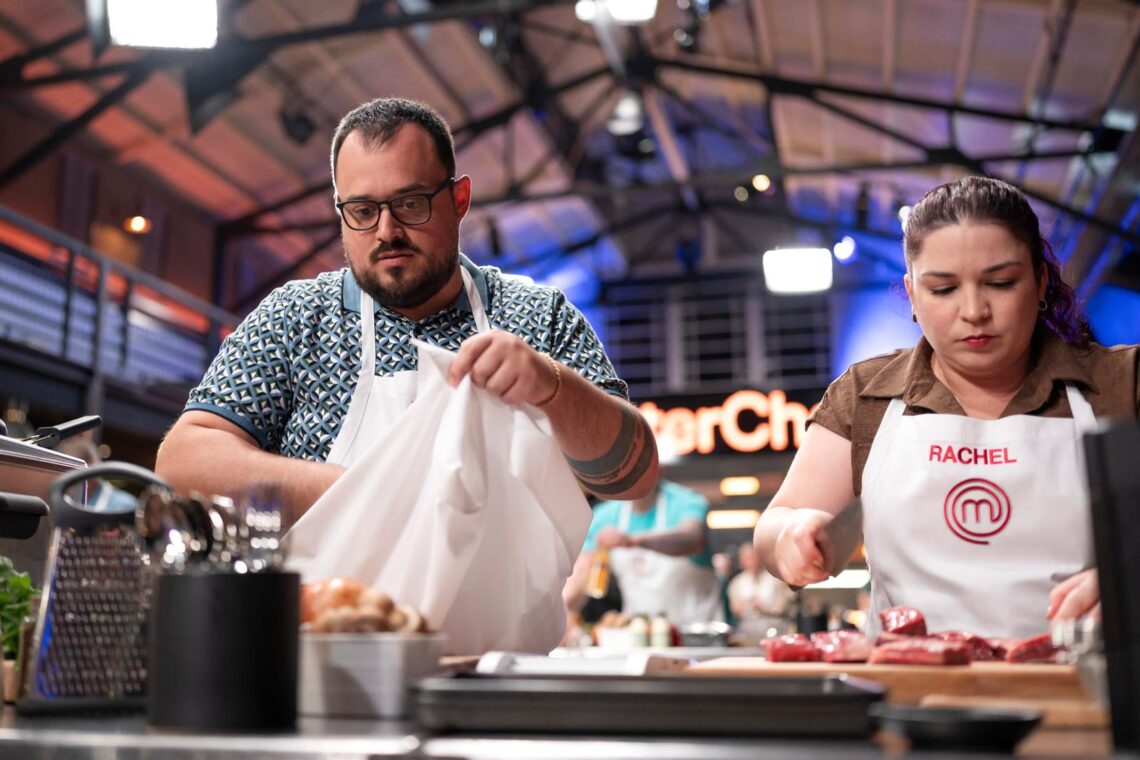
From friendship to the stove: the story of Julio and Rachel
Throughout this conversation with Rachel Sánchez, not only has the profile of a brave woman passionate about cooking emerged, but also the story of a couple who have made gastronomy a shared way of life.
Therefore, before continuing with the final questions for Rachel, we wanted to take a brief turn to hear the voice of her life and competition partner, Julio Figueredo, originally from Brazil and an inseparable member of the “Rachel & Julio” team on MasterChef USA.
Julio sincerely and warmly recalls how his relationship with Rachel began: “It wasn’t love at first sight; it wasn’t instant. We began by building a relationship based on friendship.”
He hired her as a bartender when he was working as a manager at a Mexican restaurant, and from there they began a connection that grew over stoves, dishes and deep conversations.
“Our first date was me cooking for her. And after that came many more, where we cooked for each other. Cooking together was always part of our dynamics.”
Throughout his testimony, the respect and admiration he feels for Rachel is evident: “She is a strong, independent, powerful, faithful woman who believes in God. I love how she helps me grow as a man, as a professional, as a person and as a child of God.”
He decided to take the step toward a serious relationship when he realized how much she valued his presence and what they shared. For Julio, competing on MasterChef alongside her was natural, almost inevitable: “We knew what each of us could contribute. We were a perfect couple for competing.”
How do you handle cultural differences in the kitchen? Are there any tasty conflicts?
The truth is, there are many similarities between our cultures. In gastronomy, education, art, history… we are very similar. I learned that with Rachel, getting to know her culture, her way of being, and her family.
The differences are few. Perhaps the most notable is the language, although it’s not that different either. And well, yes, sometimes there are conflicts, but wonderful ones. Each of us has our roots: I have my Brazilian customs and memories, and she has hers from Cuba.
For example, when I cook ropa vieja, I add my own touch. I respect the essence, but I don’t have the same emotional memory, so I feel freer to reinvent it. She, on the other hand, has a very strong connection with that dish. The same thing happens with my dishes: I have childhood memories, and for me, they should be a certain way, but she brings new ideas. In the end, when you try it, it tastes the same; only the presentation changes. That’s the beauty of it: we teach each other, as cooks and as a couple.
What dish would you say represents you as a couple? The one that’s a must-have at home.
I would say garlic shrimp with Spanish chorizo, polenta and Parmesan crisps. That was the dish we entered MasterChef with. It represents our cultures: Brazil and Italy for me; Cuba and Spain for her.
Of course, we have many other dishes that could also represent us, but I’ll stick with that one. It’s almost become our signature dish. We blend our roots, fuse, experiment, reinvent.
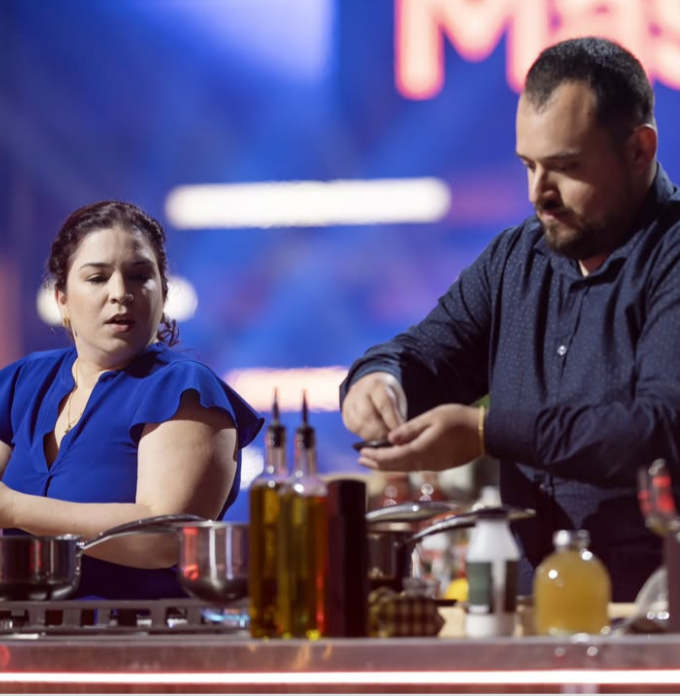
Julio, you came to MasterChef as Rachel’s partner and cooking companion, but also as someone with your own story. What does this experience mean to you?
Participating in MasterChef was very special for me, not only as a partner, but as an individual. Representing my people, the Brazilians, everything I experienced in this country as an immigrant…I’ve been here for almost 13 years and it was very exciting.
Representing southern Brazil, my family, my roots, my immigrant ancestors from Italy and Portugal who came to Brazil, being able to bring my story to a cooking competition was a dream.
Like all children in Brazil, I dreamed of playing for the national team. It didn’t happen in soccer, but I did get to represent my country doing what I love: cooking. And that was possible thanks to Rachel.
She was the one who insisted, who said, “Let’s try it.” We applied together, and God opened the doors. I feel blessed to have told my story and taken my country’s name to the next level.
Do you feel this challenge has brought you closer together as a couple? How do you handle stress and pressure without letting the rice burn — or your relationship?
Without a doubt. It was a very tough competition: mentally, physically, spiritually and based on knowledge. Competing as a couple required even more communication than we already had. We improved a lot at that: trusting, supporting each other and balancing our strengths.
There were days when one of us was fine and the other wasn’t, and the strong one would pass that energy on to the other. That allowed us to move forward, to achieve things together. We learned how to handle ourselves under pressure, to stay calm.
We’re not people who argue or talk nonsense. We talk, we understand each other, we support each other. The way we handled stress was key to growing closer — as a couple, as individuals, as friends, as everything.
Cuban pride in every dish
After learning the beginning of this story of love and flavor told by Julio, we resumed our conversation with Rachel, whose passion for cooking has not only led her to compete on one of the most demanding culinary programs in the world, but also to become a proud ambassador of her culture.
Beyond the recipes, the challenges, or the jury, for her, there’s a greater purpose: “For me, being able to represent Cuba on MasterChef, here in the United States and worldwide, is the greatest thing there is,” she asserts with conviction. Her Cuban identity doesn’t fade with distance; on the contrary, it grows stronger with every step she takes in the competition.
“Even though I’ve left Cuba, my homeland remains in my heart. I return frequently and always feel deeply proud to be able to represent my island,” she says.
Rachel feels it as an emotional responsibility: to honor her country, its people and its heritage. “I hope, no matter what happens in the competition, I can continue to be a voice and an image of what’s ours…and that people continue to support us in bringing the name of Cuba, its culture and its cuisine to all corners of the world.”
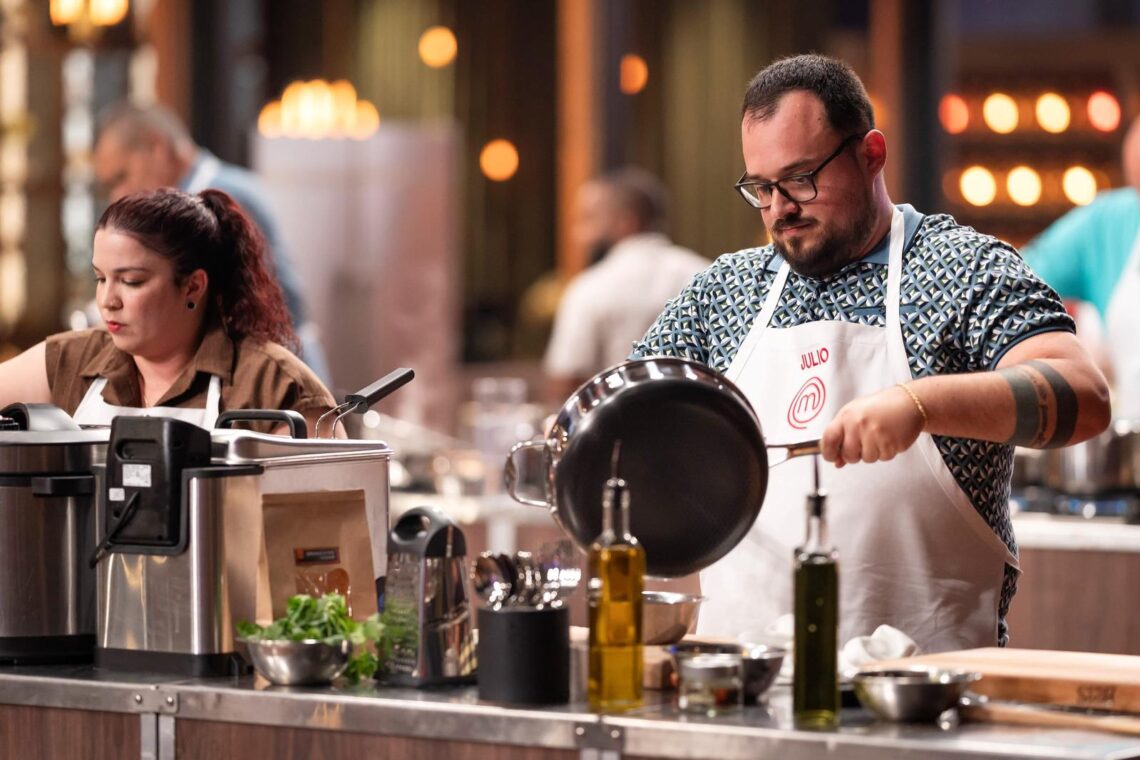
What message do you hope to leave, with your time on the show, for migrant women, mothers, Latinas and others? Do you feel like you’re paving the way for others like you?
With my time on the show, I hope many people — and especially Latino immigrant women like me — can relate and understand that nothing is impossible, that dreams can come true.
Obviously, it’s not just about saying “I want, I want” and sitting back and waiting for everything to happen. No. Dreams are achieved when you work for them.
With God in mind — because both Julio and I are people of great faith — we always said it on the show, we share it on our social media, and I repeat it here too: with God in your heart, praying as if everything depended on Him, and working as if everything depended on oneself, you can go far.
I’m not someone special. I’m just an ordinary person, but I’ve given that extra something that sometimes makes the difference. And if I could achieve it, so can anyone.
I hope this experience is not only an inspiration but also a motivation for immigrant women who, like me, have big dreams. Let them know that yes, it’s possible.
Your presence on social media platforms like TikTok and Instagram isn’t just about cooking; it’s also about closeness, authenticity, identity… Did you ever imagine having that kind of impact?
I’ve been managing my social media platforms intentionally for some time now. Years ago, I realized I wasn’t cut out to work for others, so I decided to delve into the world of entrepreneurship.
Now, I’m especially focused on cooking — and especially on baking, which is my great passion. But beyond that, my social media platforms also contain a lot of inspirational and motivational content. Because it all revolves around an idea I wholeheartedly believe in: things can be achieved.
If I had had a different story, I might not have gotten to where I am now. And I’m not even halfway there yet. Because my goal is not only to achieve personal success, but also to open the door for many others to achieve it with me.
What I want, above all, is to give glory to God and be a light for those who come after me. I want to be that guide, that anchor, that push that other women like me — or anyone — who want to take on new ventures, grow and achieve great things in life.
My deepest desire is to help others believe in their dreams and dare to achieve them.
Rachel Sánchez has not only brought the flavor of Cuba to the kitchens of MasterChef USA, but also a philosophy of life marked by faith, perseverance and the desire to inspire.
Her journey, from the memories of her grandmother’s kitchen on the island to the stoves of the world’s most famous culinary competition, is also the story of a woman who decided to believe in herself and pursue her dreams.
Today, as she mixes ingredients in search of the perfect dish, she also bakes hope, builds paths and encourages others to rise and believe. Because for Rachel, cooking — like living — is an act of love, memory, and purpose.
Quick and tasty…
A smell that transports you to Cuba: It’s that aroma of the countryside, fresh herbs, wet earth after the rain….
The food that always saves your soul: The food that always saves my soul is a good rice with chicken.
If you could open a restaurant tomorrow, what would it be called and what would the menu have?: Before a restaurant, I’d like to open a bakery or pastry shop called Masa Real. I want to offer desserts and breads that reflect the blend of my Spanish and Latin roots, creating authentic and unique flavors.
What typical Cuban word or phrase has stuck with Julio?: Julio says “Asere, what’s up?” as if he were just another Cuban.
And any Brazilian expressions you already say with pride?: There’s a word I really like: “parabéns”. I love it because it means “congratulations.” I’ve always loved celebrating people’s achievements, and I feel like “parabéns” is a very nice and cordial way to do it.
What would you say today to that Rachel who just arrived in the United States, not knowing what to expect?: The Rachel who arrived in the United States almost twelve years ago was very lost. She was experiencing anxiety attacks and severe panic attacks; she was nervous and scared, not knowing what to do.
What I can tell you is: be calm and patient. I know it’s scary now, but everything comes.
You will have a beautiful future, you will learn things you never imagined, you will meet incredible people who will impact your life, and many people will get to know you. They will use your fears and difficult experiences as inspiration to overcome their own challenges and achieve great things.
Congratulations, we’re already halfway there, but we’re going for much more!

